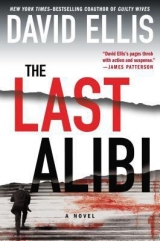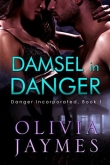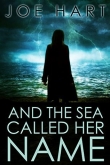
Текст книги "The Last Alibi"
Автор книги: David Ellis
Жанры:
Триллеры
,сообщить о нарушении
Текущая страница: 28 (всего у книги 31 страниц)
102.
Jason
“Detective Austin,” says Shauna, “we’ve discussed that Marshall Rivers’s use of the fentanyl injection on his victims was information that was withheld from the public, correct?”
“That’s correct.”
“Why is that? I mean, you solved the five murders, didn’t you?”
“Yes.”
“So isn’t the Marshall Rivers investigation closed?”
“No, it is not closed.”
“And why not?” she asks.
Austin doesn’t hesitate in his response. I thought he might. I thought that Roger Ogren might get to him, make him tone down a few things. But in the end, the north side murders were a huge deal and they belong to Austin; he doesn’t care much at all about my case.
He says, “Because we’ve always suspected there was a sixth victim.”
Another wave of murmurs ripples through the gallery. A sixth victim! The North Side Slasher lives on!
“Detective, I’d like to show you a document marked as Defense Exhibit One. I’m going to put it up on the screen here and ask you if you recognize this.”
The jurors, fully consumed with this testimony, turn their heads in unison, like spectators at a tennis match, to the projection screen.
Now u finaly know who I am
Now u will never forgit
Number six was difrent
But she was my favorit
“Detective,” says Shauna, “do you recognize this document?”
“Yes, I do. When we searched Marshall Rivers’s apartment on August second, we found these words typed on his computer. This is a printout of those words.”
Shauna moves for admission of the document, which is granted without objection. She pauses, giving the jurors some time to read it, and reread it, and process it.
“This document, taken from the computer of Marshall Rivers, has never been made public, either, has it?” Shauna asks.
“No, it has not.”
“It was only yesterday that this document was turned over to the defense. Is that your understanding?”
“Yes.”
“Detective, this note led you to investigate the possibility that Marshall Rivers had killed a sixth person, correct?”
“It was a possibility.”
“Did you ever find that sixth victim, Detective?”
“No, we did not.”
Shauna is quiet a moment. She looks over at the jurors, who are reading the words on the projection screen with great interest, trying to make them jibe with things that I said during my testimony.
“Detective, the third line of this note says that ‘number six was different,’ with the last word misspelled. Do you read it the same way?”
“Yes, I do.”
“Marshall Rivers’s first five murders were relatively . . . similar, weren’t they? They involved an ambush, they involved injections of fentanyl and, ultimately, brutal cutting and slashing with a folding lockback knife with a partially serrated blade. Isn’t that correct?”
“It is, yes.”
“Wouldn’t an attack that ultimately ended up as a shooting in the back with a handgun qualify as ‘different’?”
“Ob-jection,” Ogren says, more as a whine. Shauna’s question is clearly out of line.
“Sustained.”
“Well, Detective,” says Shauna, “as the lead investigator on the north side murders and on Marshall Rivers himself, do you now believe that this note was written specifically for Jason Kolarich?”
“Objection!” Roger Ogren calls out. He’s right again, but it still sounds like a gripe, a grumpy complaint.
“Sustained,” says the judge.
“Okay,” says Shauna, nodding. “Well, didn’t you take from this note that this sixth murder, his ‘favorite,’ held a unique, personal significance to Marshall Rivers?”
“Judge!” Ogren calls out.
“Because the last victim was Jason Kolarich’s girlfriend?”
“Ms. Tasker, stop right there,” says Judge Bialek. “The objection is sustained. These questions are inappropriate for this witness and you know it. Now move on.”
Shauna knows they’re inappropriate. A courtroom tactician ordinarily wouldn’t even ask these questions of a witness. She would save them for closing argument, identifying each line of the note found on Marshall’s computer and tying it to his obsession with me. Now you finally know who I am, now you will never forget—corroborating my testimony that Marshall came to me in disguise and under an assumed name. Number six was different, as Shauna said, because it turned from a knife attack to a shooting. She was my favorite, because it wasn’t just some random woman, but rather a woman very special to me.
Typically, the lawyer would save these arguments for closing, when she is free to argue anything she wants from the evidence. She wouldn’t ask them of a witness who could fight her. But Shauna has a couple of reasons for doing it now. One, she wants the reporters to hear it. She wants them to take this information and publish stories and call for an end to this prosecution, to build public pressure.
And second, she knew Roger Ogren would object. She hoped he would object. Because now the prosecution looks like it’s hiding the truth. The white hat Roger Ogren is wearing has just received a stain or two.
103.
Jason
“Since we’re on the topic of the inventory of Mr. Rivers’s apartment in early August,” says Shauna, “did you or your colleagues look at any keys or key chains recovered from his apartment?”
“Yes, we did,” says Austin. “He had a key ring that held six keys. I remember when we first searched his apartment on August second, they were hanging on a hook by his front door. Anyway, yes, this weekend we took a look at the keys on that key ring.”
“Detective, did you visit Mr. Kolarich’s house yesterday?”
“I did.”
“And who was with you when that happened?”
“I was accompanied by Detective Raymond Cromartie, Katie O’Connor from the county attorney, and you, Counselor.”
“What was the purpose of the visit?”
“To see if any of the keys on Marshall Rivers’s key chain opened Mr. Kolarich’s door.”
“And did any of the keys from Marshall Rivers’s key chain fit into the lock on Mr. Kolarich’s front door?”
He nods. “Yes, one of them did.”
That juror in the front row, the one who tends to visibly react—the one who leaned back in his chair and looked around at his colleagues when he watched me lie in the police interview—now repeats that gesture, making faces at the woman next to him, only this time I daresay his allegiance has switched to the defense.
“May I approach the witness?” Shauna asks.
“Yes.”
“Defense Exhibit Four,” she says, holding up a clear bag containing a single, rather shiny silver key. “Is this the key that you found on Mr. Rivers’s key chain that opened Jason Kolarich’s front door?”
“That’s it,” Austin says.
Shauna holds up the bag for the jury to see. No need to formally publish it, to actually hand it to the jurors. It’s just a basic house key. But it will mean everything to Shauna in closing argument. Marshall Rivers jumped Alexa as she entered Jason’s house, and he kept her key as a souvenir. He wanted Jason to know he’d killed her.
The mystery of Alexa’s missing house key is no longer a mystery.
104.
Jason
“Detective,” says Shauna, “just one final area of inquiry. We talked previously this morning about the fact that Marshall Rivers injected fentanyl in his victims. Did you find evidence at his apartment that he was doing this?”
“Yes. When we searched his apartment, we found over a dozen fentanyl patches, which can be broken down and cooked and then used for injection. We found a pack of unopened hypodermic needles. And we found three used hypodermic needles in a plastic sandwich bag.”
“And back on August second, when you discovered these three used hypodermic needles, did you test them for the presence of fentanyl?”
“We did. All three tested positive for fentanyl.”
“Did you find anything else on those hypodermic needles?”
Austin raises a fist to his mouth and clears his throat. “One of them contained trace DNA of the first two victims in this case, Alicia Corey and Lauren Gibbs,” he says. “The second hypodermic needle contained trace DNA belonging to the fourth victim, Nancy Minnows. And the third needle showed trace DNA of the fifth victim, Samantha Drury.”
“So . . . one needle had the first two victims’ DNA, another had the fourth, and another had the fifth.”
Austin nods. “Correct. And as I said before, the third victim, Holly Frazier—the needle used to inject her had broken off and was left at the crime scene. That’s how we learned about the fentanyl in the first place.”
“Sure.”
That was no accident, the needle breaking off at the third crime scene. Marshall Rivers wanted the cops to know all about the fentanyl.
“As for why Rivers used the same needle for the first two victims,” says Austin, “it’s anybody’s guess.”
Except mine. I don’t have to guess. That’s the needle Marshall Rivers stuck behind my framed prosecutor’s certificate on my office wall. At that point, he had only killed the first two women. He needed their DNA on that needle so it would implicate me.
“Now, Detective, did you recently submit those three hypodermic needles for additional DNA testing?”
“Yes, we did. Last Friday, following the testimony of Mr. Kolarich, we decided to have those three needles checked for the presence of Alexa Himmel’s DNA.”
“Did you expedite that testing?”
“We did. Yeah, I think our county lab set a new record. We got the results back last night, Monday night.”
“And?” Shauna turns toward the jurors.
Detective Austin says, “The hypodermic needle that contained trace DNA of the first two victims, Alicia Corey and Lauren Gibbs, also contained trace DNA belonging to Alexa Himmel.”
Check, please.
The judge immediately bangs her gavel, and the additional sheriff’s deputies manning the courtroom rush to silence the roar from the spectators. It takes them a while. This is too splashy for the reporters to resist. Especially when taken with everything else that has come out today—the note on Marshall’s computer that jibes with my story, my house key on Marshall’s key ring. With the possible exception of Roger Ogren and Katie O’Connor, there is not a single person in this courtroom who thinks I killed Alexa Himmel.
That was one busy needle. First, it was injected into Alicia Corey. Then it was sunk into the skin of Lauren Gibbs. Then it was hidden behind a certificate on my wall. Then it was tucked safely away in my bedroom.
Then it was sunk into Alexa’s jugular vein.
But ultimately, it made its way back to the apartment of Marshall Rivers.
It’s kind of ironic, when you think about it. Marshall was using that needle to implicate me for murder. And it ends up being used as evidence that exonerates me of a different murder.
“Ms. Tasker,” says the judge, flushed, after she finally brings the courtroom back to silence. “Do you have any further questions?”
Shauna glances at her notes, then at me. I write something on a piece of paper and show it to her. She looks at it and walks over to me. There is such a looseness to her stride, such a relaxed look on her face, that I almost don’t recognize her.
“You never said what happened to Marshall,” I whisper.
“I didn’t? I guess I didn’t,” she acknowledges. “But everyone knows what happened. Everyone knows all about him.”
We look at each other for a long time. Then she leans in and whispers into my ear.
“He killed himself,” she says. “Right, Jason?”
Shauna draws back, looks me over with a poker face. But she doesn’t wait for an answer. She returns to the podium to address the judge.
Marshall Rivers was found dead in his apartment on the evening of Friday, August 2, nearly three full days after Alexa was found dead in my town house. And two days after his rent was due. His landlord let himself in and found Marshall lying in a pool of blood. The police responded, and it wasn’t long before the search of that apartment led them to conclude that Marshall Rivers was the infamous North Side Slasher. The bloody knife, the hypodermic needles, the packets of fentanyl, all told the story. The suicide note on his computer didn’t hurt, either.
The timing of Marshall’s death was a difficult one for the medical examiner to pin down. The circumstantial evidence helped somewhat. Marshall hadn’t been scheduled to work at the dry cleaner’s on Wednesday, July 31, but he did miss work the next day, Thursday, August 1, so it looked like he died before the morning of August 1. The medical evidence? Rigor mortis had long come and gone by the time he was found that Friday night, so sometime before August 1 made sense to the coroner. The best estimate, from the larvae present, was that Marshall Rivers had been dead approximately seventy-two hours when he was found.
Marshall Rivers, in other words, died within relatively the same window of time that Alexa Himmel died.
“I have no further questions,” says Shauna. “And the defense rests.”
THE DAY OF ALEXA HIMMEL’S DEATH
Tuesday, July 30
105.
Shauna
9:05 P.M.
I sit upstairs on Jason’s bed with my iPad, doing research on addiction recovery centers around here. They certainly aren’t hard to find. But finding the right one could be a chore. So I’m looking for reviews, as well. Some of these clinics specialize in painkiller addiction, which is probably a better fit, but how the heck do I know?
I check my watch and do the math. Jason got the call from Alexa at a quarter past eight. Even with bad traffic—and I doubt traffic is bad this time of night—Jason would have reached Alexa’s house by now.
What’s going on there? It didn’t feel right, the way Jason popped up and left. Alexa calls in a breathless panic and he goes running.
She could have told him anything. Jason wouldn’t tell me, but it’s not hard to imagine. I’m going to kill myself, I swear I will! Or: “James Drinker” just tried to kill me. Anything.
I should have gone with him. He said no. That will make it worse, he said to me, undoubtedly true, but still—I should have gone.
And his ultimate rationale: I have to get my cell phone, anyway. He’d left it at Alexa’s house earlier today, after reading that threatening e-mail from Alexa about telling the Board of Attorney Discipline about his drug problem. I need to get it sooner or later.
True. And maybe that’s all it was. Sure, she’ll beg him to take her back. But he won’t. He knows better.
Maybe he’s hoping that this one last time with her will do the trick, will finally calm her down and make her go away. Fat chance, but I could see Jason thinking that, giving her the benefit of the doubt.
And I can’t discount the level of guilt he’s feeling, however misplaced it may be. No matter how much she manipulated him, he assumes responsibility for her broken heart.
Is she capable of something more? She wouldn’t hurt him, I tell myself. Would she? No. No?
But if I really didn’t see Alexa as a threat, then why did I run upstairs to Jason’s closet to retrieve his gun, hidden in the old pair of wingtips in the back of his closet? Even though I despise guns, can’t stand the sight of them, detest the very idea of them, I carried down the gun, the Glock handgun, the creepy black instrument of death, and put it in Jason’s hands.
Take your gun and be careful, I said to him.
I let out a long, nervous sigh, my stomach stirring. Then I continue my search of rehab clinics.
106.
Jason
9:10 P.M.
Blaring out from the speakerphone on my phone, held in Alexa’s hand, is Joel Lightner’s voice:
“Get ready to be happy, sport. I found him. I found our fucking guy! We were looking for cons recently released from a state penitentiary. This guy came out of a federal facility in January. You got him to confess to a gun charge, like, eight years ago, but you handed him over to the feds and they prosecuted him. We were looking in the wrong damn place! His name is Marshall Rivers. He’s got a history of violence against women and, since he got out, he’s been working at a dry cleaner’s two doors down from Higgins Auto Body! He probably saw James Drinker every day! Anyway, Marshall Rivers, does that ring—”
The recording stops abruptly, mid-sentence. I steady myself with a hand to the wall, squeeze my eyes shut, lower my head, then slowly raise it. Marshall Rivers. Marshall—
And then I remember him. I remember what happened. I remember what I did to him.
Marshall Rivers is “James Drinker.” Marshall Rivers is the North Side Slasher.
“Finally,” I mumble. Then I look at Alexa, remembering the truncated nature of the voice mail. “Did you pause the message or did it just stop there?” I ask. “Is there more?”
From her dark corner, Alexa stands slowly and inches toward me, crossing the line of the television light, blocking it out, leaving us in darkness, her features changing with each step—
–the face of a ghost, a haunted figure, piercing eyes, a wry grin, a scowl, terror and rage and panic and fear—
“There’s more,” she says to me. “There’s a lot more.”
She pushes a button, and the recording continues.
“—a bell with you? Anyway, it’s him, Jason, I know it! He lives here in the city. He’s on Hampton, 2538 Hampton, Apartment 1. Call me back, man. We fucking got him!”
I stare at Alexa’s hand, at my phone. My eyes adjusted to the darkness, I make out her face better, almost cartoonish, dark and eerie.
“You’ve been crying,” I say.
I walk over to the wall and flip on a switch. Alexa winces, her eyes squinting in the light.
“I have to call Joel,” I say. “Then you and I have to—”
“No, don’t do that.” She shakes her head slowly, something in her eyes, in the certainty of her tone, revealing herself to me. She approaches me slowly. She is freshly showered, her hair still wet, dressed in baggy, kick-around sweats.
I put my hands on her shoulders. “Alexa,” I say, “what did you do?”
She touches my cheek, her hand trembling furiously. Only then, up close, do I see that her whole body is quivering. Her legs buckle, and I catch her, helping her to the couch. I stand over her.
“Tell me,” I say.
Her eyes search me, her nostrils flaring, her mouth moving without sound. “I fixed it,” she says. “I fixed everything for you.”
“Did you—”
“He can’t hurt you anymore,” she whispers. “He can’t hurt us.”
I take the phone from her hand and check the voice mail we just heard. The call came from Lightner today at 2:04 P.M. She listened to this message a long time ago, back when Joel called. She has known for seven hours where Marshall Rivers lives.
Alexa takes the phone from my hand and pushes a button, erasing the voice mail.
“Tell me you didn’t go over there, Alexa—”
“Shh.” She reaches her hand out to my mouth. “It’s okay. Nobody will ever know.”
I step back from her, put my hands on my head, furiously scrubbing my hair. “This—this isn’t happening.”
“It’s okay,” she says to me, lifting herself off the couch toward me. “I’ve been planning for this. I did everything right. It looks like a suicide.”
I push away from her and pace in a small circle, passing the movie on the television, the open pizza box with only half a piece missing, cut sharply with a knife.
“It was easy,” she tells me. “I knocked on the door, and he opened it. I asked him if he wanted some company. He thought I was a—I dressed the part—he thought I was, y’know, a prostitute. A skimpy outfit and a fake blond wig and sunglasses was all it took to get him to open his door.”
I don’t say anything, just shut my eyes and listen, my head against a wall.
“I have a Taser. I’ve always had one. Did you know that?”
I shake my head no.
“It was the easiest thing. I only needed a few seconds. I got him in the neck and he went right down. I dragged him into his apartment and I cut his wrists with his own knife. It looks like he killed himself. It does. I swear it does.”
“Alexa.” I turn, put my hands on my knees like a third-base coach. “The police are professionals. They’re not—”
“What, are you going to tell me about hesitation wounds? I read all about them, Jason. I know that when people slit their wrists, they hesitate first and don’t cut deeply. I did all that. I stood behind him and I used his own hands around the knife and I did some shallower cuts first. And I did the left wrist more deeply than the right. I did it perfectly!”
“Even so.” I flap my arms. “And don’t you think the police can look at your Internet searches and wonder why you were reading up on hesitation wounds?”
“What reason would they have to check? I have a really good alibi.”
I let out a nervous sigh. “And what’s that?”
“Look around you.” She gestures with her hands. “I ordered Doctor Zhivago on pay-per-view and I had pizza delivered. Does that sound like someone who went out and committed murder?”
“Oh, Alexa.” I shake my head. “You could have made a hundred different mistakes. You’re better off turning yourself in and explaining that you were trying to stop a serial killer. We—we have to go to the police. I’ll represent you. I’ll do everything I—”
“This man was a monster,” she hisses. “He butchered five women and he wasn’t going to stop. I could see it, Jason. I could see it in the way his eyes passed over me when he answered the door, like he was imagining what it would be like to do the same thing to me. Are you really telling me you wouldn’t have done exactly what I did?”
I don’t confront that question. I’d spent so much time trying to figure out who he was and how to stop him, I hadn’t decided on a game plan once I found him. Would I have killed him? I don’t have the time or the need to answer that now.
“He’s out of the way now,” she says. “Don’t you see?”
He’s out of the way. I wipe at my mouth, fidgety, trying to work through this, feeling unmoored, disoriented. She did this for me, I think to myself. She did this so we could be together.
We are both quiet. She is looking at me, waiting me out, her head cocked to one side, her lips slightly parted.
“How do we even know Joel was right?” I ask. “How do we even know Marshall Rivers was our guy?”
Alexa reaches into her sweatpants and produces something, a card of some sort.
“Your business card,” she says. “Sitting next to his computer.”
She holds it out. I walk over and take it. Holding it in my hand, seeing this card on fancy, cream-colored stock, JASON KOLARICH, ESQ. in royal blue, returns me to my law office, to the man in the goofy disguise, pumping me for information, planting a hypodermic needle in my office, plotting to kill women and make sure I knew all about it.
And then it solidifies for me, something for which I’ll have to answer someday, a decision: She shouldn’t have to go to prison for this. However messed-up her reasoning may be, she shouldn’t suffer for this. Marshall Rivers deserved to die.
I drop my head. “I . . . don’t even know what to say.”
“Say you’ll help me,” she whispers.
I look up at her. Tears have formed in her eyes.
“Because you were right,” she says. “I did make a mistake.”








